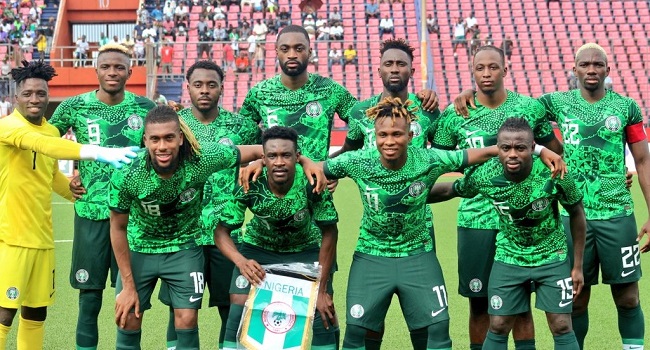Nigeria’s lengthy search for a head coach is nearing its conclusion, but complications remain with two candidates still in contention.
The Super Eagles have been without a permanent head coach since Finidi George stepped down after just two matches into a two-year contract he signed in May.
George, a member of Nigeria’s 1994 Africa Cup of Nations (Afcon)-winning squad, initially took on the role in an interim capacity during the March international window.
During his brief tenure, George secured only one victory in four matches, with a 2-1 loss to Benin marking the end of his time in charge. This defeat left Nigeria second from the bottom in their 2026 World Cup qualifying group.
Amid widespread speculation and the involvement of the country’s sports minister, Nigeria has narrowed the search to two candidates: Swedish coach Janne Andersson and Frenchman Hervé Renard.
With qualifying for the 2025 Afcon set to begin on 7 September, the Nigeria Football Federation (NFF) is under pressure to make a timely decision.
Andersson keen – but needs time
Andersson is considered a pragmatic choice for Nigeria, both in terms of his profile and affordability.
The 61-year-old concluded a seven-year tenure as Sweden’s head coach last year, during which he led the team to the quarter-finals of the 2018 World Cup and the last 16 of the 2020 European Championship.
However, his later years with Sweden were marked by underperformance, leading to his resignation in November after failing to qualify for the 2022 World Cup or Euro 2024.
Andersson, who has only coached in Sweden, holds a domestic league title with IFK Norrköping and is reportedly excited about the opportunity to manage in Africa, despite concerns about his lack of international experience.
Some critics have raised issues regarding how his time with Sweden ended, but the Nigeria Football Federation (NFF) remains confident in Andersson’s professional approach.
His decision to recall Zlatan Ibrahimović to the national team, even after the former AC Milan and Barcelona striker publicly questioned his abilities, is seen as a testament to his pragmatism.
The main challenge to his appointment is that, due to personal reasons, Andersson would only be available to start in mid-September.
By then, Nigeria’s 2025 Afcon qualifiers against Benin and Rwanda will have already taken place.
A potential solution could involve his assistant, Peter Wettergren, working alongside an interim coach—most likely NFF technical director Augustine Eguavoen—for those initial matches.
Can the NFF afford Renard?
Renard has the more prominent profile of the two candidates, but securing his appointment would be far more challenging.
The Frenchman has had significant success in African football, being the only coach to win the Africa Cup of Nations (Afcon) with two different nations.
Renard also guided Morocco and Saudi Arabia to respectable performances at the 2018 and 2022 World Cups, respectively, including a famous victory over eventual champions Argentina in a group match at the latter tournament.
Most recently, he led France’s women’s team to respectable, though somewhat underwhelming, quarter-final exits at the 2023 Women’s World Cup and this year’s Olympics.
Having recently been passed over for the United States men’s national team job, the 55-year-old has received interest from several European, African, and Asian countries, despite not actively seeking a new position.
Egypt is reportedly willing to offer him a $2 million (£1.5 million) annual salary, a figure Nigeria would struggle to match.
A top NFF official described Renard’s financial demands as “practically outrageous,” a notable comment given that Nigeria is offering the largest contract for a head coach in its history.
Despite these financial challenges, Renard remains the preferred candidate due to his extensive experience and successful track record in African football.
He is also reportedly enthusiastic about the prospect of managing one of the continent’s top teams.
However, time is running out for both parties to reach an agreement.
A bumpy ride ahead
Whoever emerges from the recruitment process will face significant challenges.
What initially appeared to be a straightforward World Cup qualifying draw has turned out to be more challenging than expected, with unfancied Rwanda leading Group C, while only Zimbabwe has a worse record than Nigeria after four rounds of the 10-game campaign.
The new head coach will also need to quickly win over the media and a disillusioned fanbase.
The Super Eagles’ unexpected run to the final of Afcon 2023 now seems like an outlier amidst an overall downward trend.
This decline is partly due to the lack of essential infrastructure within Nigeria’s football administration.
Currently, there is no permanent home ground for the men’s and women’s national teams, with recent matches primarily hosted in Uyo, as the Godswill Akpabio Stadium is the only venue that meets the Confederation of African Football’s standards for international fixtures.
Additionally, Nigeria lacks a dedicated training facility comparable to England’s St George’s Park or France’s Clairefontaine, leading to ad-hoc arrangements for training.
Another ongoing issue is the delayed payment of allowances and match bonuses to players, a problem that continues to affect the current squad.
These challenges, which impact both morale and performance, will be crucial for any prospective head coach to address as the Super Eagles aim to qualify for Afcon 2025 and revive their faltering World Cup qualifying campaign.

